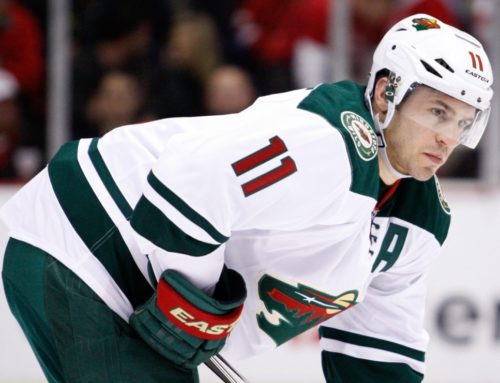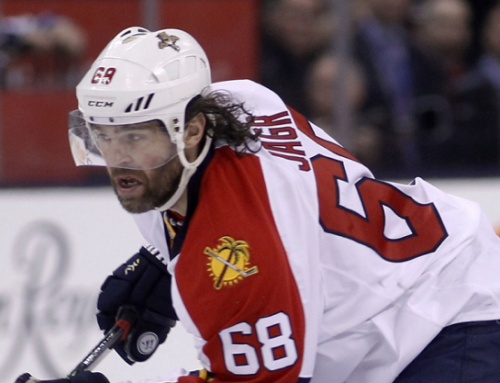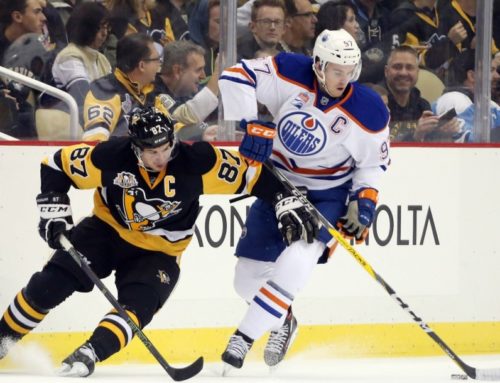
A proposal to create incentives for teams to score more goals.
There have been countless articles written about the NHL’s scoring system like the one penned by Pierre LeBrun that focus on the ‘Loser point’ and the argument to get rid of it. There have also been many other columns written about the lack of scoring, like Ken Campbell’s, which provide us with goal scoring stats so low that only mortgage rates are lower.
What is being talked about will not solve the problem.
Seriously, if players are not allowed block shots, Campbell alludes to as one radical idea, then players should not be allowed to screen goalies and then we might as well attach a long metal rod on to each of them and simulate playing table hockey.
Angling the posts so puck bounce inward is also an idea that will not truly solve the issue of low goal scoring. Changing the NHL’s scoring system will force teams and their coaching staffs to develop goal scoring talent and systems as opposed to defensive oriented play and schemes.
LeBrun’s take is similar to most others, get rid of the inflationary ‘Loser point’ and make all games worth three total points and the reason to make the change is because parity between teams has been successfully reached.
His proposal is, every game has three points up for grabs. 3-2-1-0:
- Win in regulation you get three points
- Teams will earn two points if they win in overtime or the shootout
- Teams that lose in extra time or the shootout will get one point, and
- Those that lose in regulation will earn nothing
People have suggested getting rid of the loser point before. Some want to go back to just a two-point game and others want to bring back ties.
LeBrun quotes Nashville Predators GM David Poile as saying “I understand your point, but I think this falls into the category of: If it ain’t broke, don’t fix it. The system works.”
Really?
The Los Angeles Times has an article regarding the rule changes for the 1999-2000 season. This is the season that the ‘loser point’ was born in.
Then coach for the Anaheim Ducks, Craig Hartsburgh, told the Times “When you're playing within your own conference and your own division, you're going to probably still have the approach, 'Let's be cautious, let's be smart. We don't want to give up a point and we'll take another if they make a mistake.' When you play the other [conference], it may be different. I won't say it will open up, but you do less damage if you lose.”
His then goalie, Guy Hebert, added “A point is really important for teams, especially on the road, and you can tell your goalie, 'Hey, we're going to be taking chances. Just do your best. If you lose, you're not going to lose everything. I think it will increase the excitement in that five minutes. It will be nerve-racking for goaltenders, though, because one mental lapse, and you skate off a loser.”
If that change did make the game more exciting and create more scoring then why did the league recently switch the overtime rules to allow for three-on-three play?
If that change did work as well as it was supposed to, then why did the league adopt the shootout for the 2005-06 season?
The league wanted to reduce the number of games that resulted in a tie. Stats before the 1999-00 change:
|
Season |
Ties |
Total Games |
Percentage Tied |
|
1994-95 |
214 |
1092 |
19.6 |
|
1995-96 |
101 |
624 |
16.2 |
|
1996-97 |
201 |
1066 |
18.9 |
|
1997-98 |
219 |
1066 |
20.5 |
|
1998-99 |
221 |
1107 |
20.0 |
Results starting with the 1999-00 season:
|
Season |
Ties |
Overtime (OT) |
Total Games |
Percentage Tied |
Percentage OT |
|
1999-00 |
146 |
260 |
1148 |
12.7 |
22.6 |
|
2000-01 |
145 |
274 |
1230 |
11.8 |
22.3 |
|
2001-02 |
138 |
270 |
1230 |
11.2 |
22.0 |
|
2002-03 |
141 |
313 |
1230 |
11.5 |
25.4 |
|
2003-04 |
165 |
315 |
1230 |
13.4 |
25.6 |
The number of games that resulted in a tie went dramatically down, but the number of games that went to overtime was significantly more that the number of games that were previously tied after regulation. Meaning, teams figured out systems that allowed them to earn the extra point. Boring!
So, the NHL brought in the shootout to do away with ties forever:
|
Season |
OT+SO |
Total Games |
Percentage |
|
2005-06 |
281 |
1230 |
22.8 |
|
2006-07 |
281 |
1230 |
22.8 |
|
2007-08 |
272 |
1230 |
22.1 |
|
2008-09 |
282 |
1230 |
22.9 |
|
2009-10 |
301
📢 advertisement:
|
1230 |
24.5 |
|
2010-11 |
297 |
1230 |
24.1 |
|
2011-12 |
300 |
1230 |
24.4 |
|
2012-13 |
162 |
720 |
22.5 |
|
2013-14 |
307 |
1230 |
25.0 |
|
2014-15 |
306 |
1230 |
24.9 |
Weaker teams continued to push games to extra time and in particular the shootout because they had a better chance of winning a game in the shootout than in normal play. Approximately 57% of games that needed extra time were finalized by the shootout during this period.
The league did not like that so they tweaked the rules for 3-on-3 play in OT:
|
Season |
OT+SO |
Total Games |
Percentage |
|
2015-16 |
275 |
1230 |
22.4 |
|
2016-17 |
85 |
358 |
23.7 |
While that change did have the desired effect, approximately 39% of extra time games were ended by the shootout, there are still more games requiring extra time than there were games that ended in a tie (pre-1999-00). Teams still milk the system for the inflationary extra point.
What is even worse for poolies such as yourselves is that when a game is decided by a shootout, your players earn no fantasy points, unless you have a category for shootout goals but few leagues do.
We know of people that switch to other programming because they understand that whatever happens in a shootout does not change anything with regards to their fantasy rosters. Determining the winner of the contest is supposed to keep you glued to your screens.
It is possible that LeBrun’s proposed idea could change the current culture but what prevents it from being adopted is closed minded thinking from some hockey people like Brian Burke.
As mentioned in LeBrun’s article, Burke indicates “I researched this quite a bit. I read a very detailed study about English soccer, which I forwarded to the league. The basic conclusion of this study is that it had no impact on results, that players were properly incentivized to win the game regardless” and “You will have teams mathematically eliminated from the playoffs by Christmas. I have zero interest in that. None. I'd rather put a sharp stick in my eye.”
The counter point to the English soccer study is that they play 38 games to determine the Championship and relegated teams. Not 82 games for one of 16 playoff spots with no relegation to a lower league. Therefore, it is understandable why English soccer players are properly motivated. Burke should have been able to see this. Maybe he should stop playing with sharp sticks as it is affecting his vision.
On the whole the 3-2-1-0 proposal is skewered from the fear that teams (their own team) would be eliminated early in the season, like Burke talks about.
What is needed is a system that promotes scoring without gimmickry on the ice which also allows teams to remain in the hunt for a playoff spot.
I propose to you that not all games be worth a fixed set of points.
When you go fishing, not every fish that is caught weighs exactly the same. When you have been fighting to reel one in but the line snaps before you can get the fish onto the boat, well you did not earn a partial fish. You caught nothing so you go hungry until you are victorious.
Points should instead be awarded to the victorious team based on the regulation time goal differential.
- Win in regulation, the team earn whatever the goal differential is plus an additional victory point
- Win in overtime, the victorious team only earns the single victory point
- Win in the shootout, the victorious team earns no points but does have a win on the books
- Losing teams earn nothing at all times
Teams that are tied in points, will have a tie breaker based on the number of wins they earned.
Here is an illustration of what that victory system would look like under the current season:
|
Metropolitan |
GP |
Victory System Points |
NHL Points |
|
NY Rangers |
25 |
60 |
33 |
|
Columbus |
22 |
45 |
30 |
|
Pittsburgh |
24 |
40 |
31 |
|
Washington |
22 |
37 |
28 |
|
Philadelphia |
25 |
23 |
27 |
|
NY Islanders |
23 |
23 |
22 |
|
Carolina |
23 |
21 |
23 |
|
New Jersey |
23 |
18 |
26 |
New Jersey looks to be one of those teams that currently earns many of their points through extra time.
For those like Burke, who worry teams cannot recover I give you the Columbus Blue Jackets 10-0 victory over the Montreal Canadiens on November 4th, 2016. That was an 11-point gain in a single night.
(To save my editor some work with tables I will just list the other teams and their victory system points)
Atlantic
- Montreal 49
- Tampa Bay 46
- Boston 36
- Toronto 34
- Ottawa 27
- Florida 24
- Detroit 24
- Buffalo 23
Central
- Nashville 44
- Minnesota 38
- Chicago 34
- St. Louis 34
- Winnipeg 31
- Dallas 22
- Colorado 20
Pacific
- Edmonton 43
- Anaheim 41
- San Jose 40
- Los Angeles 32
- Calgary 25
- Vancouver 15
- Arizona 11
What this system asks for is that if you are leading you want to keep on increasing your lead. You cannot afford to coast offensively or defensively. An 8-7 game is worth the same as a 2-1 game.
If you are down, you continue to want to catch up and not let in any more goals go into your net because it will be harder to catch that team in the standings.
With the victory scoring system the NHL will be promoting exactly what fans want to see, sixty minutes of a high intensity struggle between teams. Not five minutes of 3-on-3 play.
For a league that defines itself on being fast and skilled they have a scoring system that influences coaches to act the exact opposite. They fear that they will lose their jobs unless they win, so play it safe, get the one point for going into extra time and then pray you can eke out a victory in the next five minutes or during the shootout.
General Managers, Presidents and other higher-up figures fear that their team will look bad or silly if they are embarrassed by much more skilled teams. Their fans would not come to watch or support them so keep with the system that ain’t broke. At least the team looks like it is in the thick of things until it is not in early March.
But, the system is broke. Scoring is not improving or being developed.
It is time for the emphasis to come back to the skilled. Time for the strong to be able to eat what they kill.
3 Comments
Leave A Comment
You must be logged in to post a comment.





 MTL
MTL
 PIT
PIT FLA
FLA S.J
S.J CGY
CGY MIN
MIN N.J
N.J

This is interesting. Thanks. Would love to see companion article at the end of the season showing what the final standings and playoff matches would be.
It’s an interesting idea but it does seem like it’s a bit gimmicky. Sure there is an incentive but then goalies would be that much more stressed and yanked way more quickly if they let in a couple quick goals. Coaches would have knee-jerk reactions instead of letting a goalie calm down.
I think they should abolish definite OT. It should be like playoff hockey. You play for 2 points or nothing. No ties, no shootout. It’s also an incentive to end the game that much sooner because if you have back-to-back games, you’re going to want to end it. I realize this isn’t perfect but what would be.
That’s a well-documented opinion, but one that rely a bit too much on the author assuming we’re all bored by the current game. Low and high scoring affairs can be just as exciting, as points scored are not an appropriate way to evaluate the product on the ice. Olympic hockey is all about putting on display the most skilled players in the world, and nobody complains when these games end 2-1.
If teams “milk” the system to get the extra point whenever they can, it just means that coaches leverage all the tools at their disposal, including the rules, to help their team out. Why not use it if it serves you well? I’m pretty sure they’d all prefer to win in regulation and save their players of the extra effort, energy-drain and risk of injury. But sometimes, you just can’t so yeah, do what you can from the bench.
I love Fantasy hockey just as much as you do. But high and low scores are just as helpful/detrimental to you than they are to your opponents. So increasing the scoring isn’t driving anyone forward. It’s a big thing to pretend the system is broken just because you envision ways to tailor the game differently.
And as for those people who stop watching when the game heads into shootout, well good for them for saving that one minute of their time. They’ll be more rested in the morning. But I would think most people who watched the game would want to know who wins in the end.
Cheers.